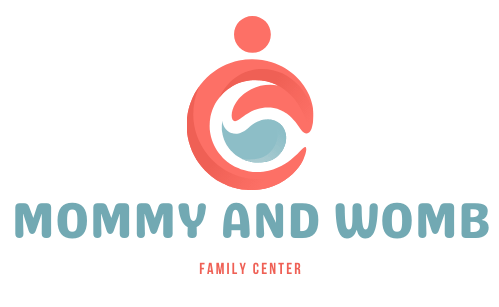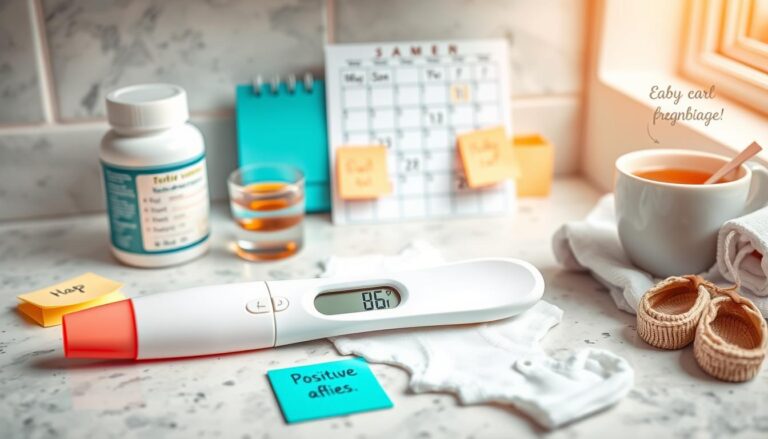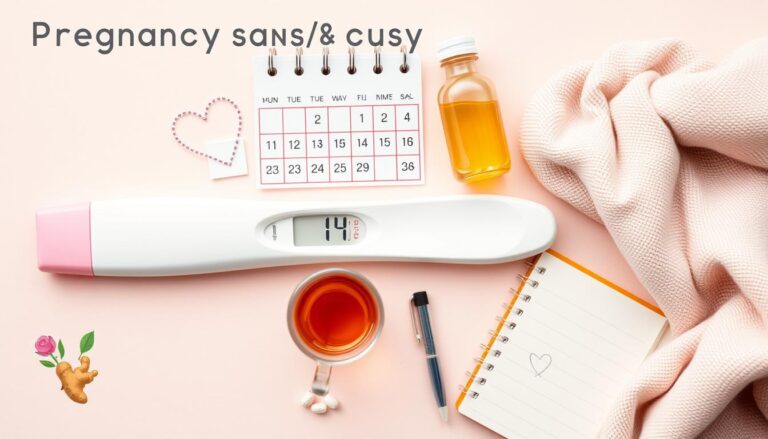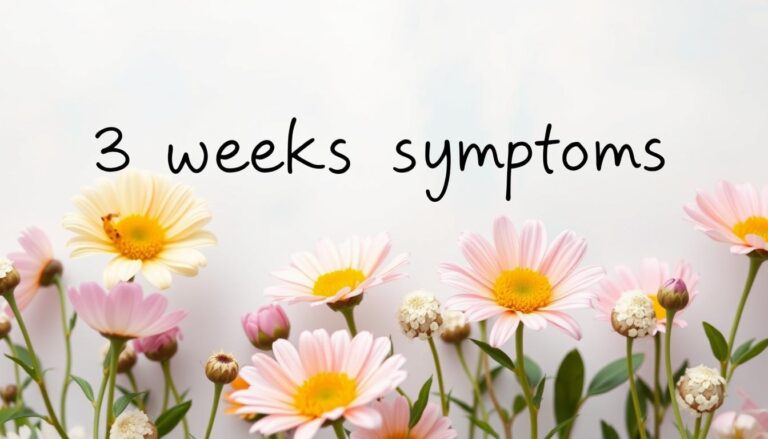6 Weeks Pregnant: Early Signs and Development Guide

Congratulations! You’re now in the second month of your pregnancy. Your baby is as small as a sweet pea or a nailhead. They are about 0.2 inches or 5-6mm long and look like a tadpole with a curved shape and a bump for the head1. The baby’s heart beats fast, around 110 times per minute or more1. By the fourth week, the neural tube, which forms the brain and spinal cord, has closed.
You might feel tired, have to pee a lot, feel your breasts sore, and feel sick or bloated2. These feelings come from the fast changes in your hormones and your baby’s need for food and energy.
Table of Contents
Understanding Your Pregnancy Timeline at Week 6
At week 6, you’re in the first trimester and the second month. Your body is changing a lot, and your baby is growing fast3.
How Weeks and Months Align in Pregnancy
Pregnancy lasts about 40 weeks or 280 days3. The first trimester goes until 13 weeks. Then, the second trimester is from weeks 13 to 28. The third trimester is from week 29 to 403.
Your due date is just an estimate. But, full-term pregnancies are usually between 39 and 40 weeks, 6 days3.
Key Milestones at Week 6
At 6 weeks, your baby’s brain and spinal cord start to form3. The heart begins to beat, and you might feel your maternal instincts4. Your baby’s face and limbs are starting to develop4.
What to Expect During Month 2
In the second month, you might feel more tired, sick in the morning, and moody4. Taking care of yourself and going to prenatal appointments is key3.
“Embrace the changes in your body and mind during this transformative time. Your pregnancy timeline is unique, and each milestone is a step closer to meeting your little one.”
Every pregnancy is different. Listen to your body and work with your healthcare provider34.
Baby’s Development and Growth Progress
As your pregnancy advances, you’ll see your baby grow in amazing ways. At 6 weeks, the5 embryo is as small as a nailhead or a sweet pea. It’s just a tiny bit over a quarter of an inch long. Yet, its vital organs are quickly forming.
Size and Physical Appearance
The baby looks like a tiny tadpole early on. It has a big head and a growing brain and spinal cord5. By week 6, the6 baby’s heart starts beating, and you might see it on an ultrasound.
Organ Development
The baby’s organs grow fast as it grows. By week 5 to 8, the6 heart and blood vessels start forming. By week 7, the6 heart beats. Arms and legs buds also start to form.
Formation of Facial Features
The baby’s face starts to take shape too. You’ll see the start of eyes and jaw, cheeks, and chin. The6 ears are small dimples. As the6 baby grows, its face will get clearer. By weeks 10 to 11, eyelids, longer limbs, and other details like fingerprints and teeth buds will appear.
The journey of fetal development is truly amazing. These early weeks lay the foundation for your child’s growth and health. Understanding these changes helps you prepare for the exciting journey ahead.
Common Symptoms at 6 Weeks Pregnant
As your pregnancy advances, you might feel a variety of symptoms by the sixth week. Hormonal shifts can cause you to pee a lot, feel tender breasts, and get tired easily. Morning sickness, with its nausea and vomiting, affects many women at this time7.
Bloating and gas are common as your body gets used to the hormonal changes. Mood swings and cravings for certain foods or aversions to others are also common. Remember, every pregnancy is different, and symptoms don’t always mean the pregnancy is healthy7.
Some women might not notice any symptoms at 6 weeks. But, it’s crucial to watch your body and see a doctor if you’re worried. Severe headaches, dizziness, and fever are signs of serious issues and need quick doctor visits8.
Also, extreme swelling, thoughts of harming yourself or your baby, and trouble breathing are warning signs that need immediate doctor care8. By being alert and talking to your healthcare provider, you can help ensure a good outcome for you and your baby.
“Monitoring symptoms and seeking medical attention for concerns is advised.”
Your Changing Body During Early Pregnancy
As you start your pregnancy journey, your body is changing in amazing ways. It’s preparing to support your baby’s growth. These early weeks are key for both you and your baby.
Hormonal Changes
In the first trimester, your body makes more hormones like hCG, progesterone, and estrogen9. These changes can cause symptoms like morning sickness, which affects about 90% of pregnant people9. Morning sickness can be tough, but vitamin B6 and ginger might help ease it9.
Physical Transformations
As pregnancy goes on, you might see physical changes. Your breasts could get tender and bigger, and you might notice veins more on your belly, breasts, and legs9. Your skin might also glow more because of blood flow and hormone changes9. You might also see changes in your vaginal area, like a thicker lining and white discharge, which are normal9.
You might not see a bump yet, but your uterus is growing. A bigger belly is expected to show up more in the second trimester9. Prenatal vitamins with iron can cause constipation, so fiber or stool softeners might help9. Drinking eight glasses of water a day can also prevent constipation9.
Emotional Adjustments
Pregnancy can also affect your mood. You might feel mood swings, forgetfulness, and trouble focusing, especially if you’re tired or stressed9. These feelings are normal, and it’s okay to be kind to yourself and ask for help when you need it.
Every pregnancy is different, and the changes you feel might not be the same as others. Understanding what your body is going through can help you get through this exciting and sometimes tough time. It’s all about taking care of you and your baby.
Essential Nutrition and Dietary Guidelines
Keeping a balanced diet is key during pregnancy. Make sure to eat foods full of nutrients like folic acid, iron, calcium, and protein10. Folic acid is especially important for preventing birth defects of the brain and spine10.
It’s important to get enough calcium for your baby’s bones and teeth10. You can find calcium in milk, yogurt, and other dairy products10. Also, don’t forget about iron for your baby’s growth and brain development11. You can get iron from lean meats, poultry, legumes, and prenatal vitamins10.
- Avoid raw or undercooked meats, unpasteurized dairy, and high-mercury fish like shark and swordfish10.
- Limit your caffeine intake to less than 200 mg per day, as excessive caffeine can increase the risk of miscarriage11.
- Steer clear of alcoholic beverages, as there is no safe level of alcohol consumption during pregnancy10.
To fight nausea, eat small meals often and take prenatal vitamins at night10. Drink plenty of water and listen to your body for your health and your baby’s10. Talk to your healthcare provider for advice on what to eat and any special needs11.
“Proper nutrition during pregnancy is essential for the healthy development of your baby and your own well-being.”
Preparing for Your First Prenatal Visit
Your first prenatal visit is key to a healthy pregnancy. It usually happens between weeks 6-812. You’ll get a full health check, including a physical exam, a look at your medical history, and blood tests12.
What to Expect
Your healthcare provider will do many tests at your first visit. They’ll check your blood type, Rh factor, and for STIs and genetic issues12. They might also do an ultrasound to find out your due date and check for any birth defects12.
Questions to Ask Your Healthcare Provider
This visit is a great chance to get to know your healthcare provider. Talk about your family’s health history, any health issues you have, and what medicines or supplements you’re taking13. They can also give advice on diet, exercise, and lifestyle changes during pregnancy13.
Important Medical Tests
At your first visit, you’ll have many medical tests. These include a blood count, blood typing, and tests for rubella, hepatitis, syphilis, and HIV12. You might also have a urine test and culture12. Depending on your history and risk factors, you could have genetic tests like NIPT or CVS13.
Getting ready for your first prenatal visit is crucial for a healthy pregnancy. Knowing what to expect and asking questions helps you work closely with your healthcare provider.
Managing Early Pregnancy Discomfort
Early pregnancy brings both excitement and discomfort. Morning sickness and fatigue are common in the first trimester. But, with the right steps, you can ease these symptoms and take care of yourself.
Morning sickness affects many pregnant women14. It usually goes away by weeks 16-2014. But, a severe form called hyperemesis gravidarum can cause dehydration and malnutrition14. To help, rest well, avoid certain foods and smells, and eat small meals often14. If it’s still hard, your doctor might suggest medication14.
Fatigue and breast tenderness are also common. Rest well and take short naps to fight fatigue. Wear a supportive bra for breast comfort. Drinking water and eating fiber can help with constipation.
Emotional changes like mood swings and stress are part of the journey too. Try relaxation techniques like deep breathing or prenatal yoga15. Also, avoid tight clothes to reduce bloating discomfort15.
If symptoms get worse or worry you, talk to your healthcare provider15. By tackling early pregnancy discomfort, you can focus on your health and well-being during this special time16.
Important Lifestyle Changes and Precautions
When you’re pregnant, making lifestyle changes is key. It’s about your health and getting ready for parenting. Here are the main things to think about during this special time.
Safe Exercise Options
Staying active is good for you and your baby. But, pick the right exercises. Walking, swimming, and prenatal yoga are safe and good choices17.
Avoid high-impact exercises and sports that could cause falls. These can harm you or your baby17.
Activities to Avoid
Some activities and substances are off-limits during pregnancy. Stay away from saunas, hot tubs, and steam rooms. They can cause overheating and dehydration17.
Don’t overdo caffeine, and quit smoking and vaping. They’re bad for you and your baby17. And remember, there’s no safe amount of alcohol during pregnancy17.
Workplace Considerations
If you work, pay attention to your job environment. Avoid harmful chemicals and heavy lifting. Make sure your workspace is ergonomic and take breaks often17.
Before taking any medications or supplements, talk to your doctor18.
By making these changes, you can have a healthy pregnancy and a smooth start to parenting.
Prenatal Care and Medical Considerations
Regular prenatal care is key for a healthy pregnancy19. Almost all women in the U.S., about 98%, start prenatal care during their pregnancy19. This care begins after a positive pregnancy test, with a confirmed sonographic intrauterine pregnancy19.
Your first prenatal visit includes a detailed medical history, physical exam, and tests19. It’s best to do this in the first trimester to spot high-risk pregnancies early19. But, some women start later due to health or social reasons19.
Your provider will check your health, like blood pressure and BMI19. Women with a BMI of 30 kg/m² or higher face more pregnancy risks19.
Prenatal care also includes screenings and tests, like genetic testing19. Your provider will explain these tests and help you decide19.
Good oral hygiene and dental check-ups are part of prenatal care20. Also, getting vaccinated, like the flu shot, is important for your and your baby’s health20.
Always tell your healthcare provider about any unusual symptoms or concerns20. Working with your provider ensures a healthy pregnancy and a good outcome for you and your baby20.

“Regular prenatal care is essential for a healthy pregnancy and positive birth outcome. It’s important to work closely with your healthcare provider to ensure the well-being of both you and your baby.”
Planning Ahead: Next Steps in Your Pregnancy Journey
Starting your pregnancy journey means planning for what’s next. Look for childbirth classes that fit your due date and sign up for one you like. Think about your birth plan and what kind of delivery you want.21
Also, check your workplace’s maternity leave policies and plan accordingly. Start a pregnancy journal to record your journey. Make sure you understand your health insurance for pregnancy and childbirth21.
Getting ready for the baby might mean making home changes or buying new things. Talk to your partner about how you’ll parent to make sure you’re in sync.
By being proactive, you’ll feel more organized and ready for pregnancy and parenthood.
“The best preparation for tomorrow is doing your best today.” – H. Jackson Brown Jr.
Pregnancy is a special time, and every woman’s experience is unique. Be flexible, rely on your support system, and enjoy the journey as you prepare for your new life21.
Conclusion
Starting your 6-week pregnancy journey is exciting. Your body and baby are going through big changes22. Your baby’s heartbeat is between 90-110 beats per minute22. Organs like the brain, heart, and limbs are starting to form22.
This is a time of amazing growth and change. It’s filled with both physical and emotional shifts.
Take care of yourself by eating well and getting regular check-ups23. A balanced diet is key24. These steps help keep you and your baby healthy23.
Lean on your loved ones and your healthcare provider for support. Every pregnancy is different. Trust your instincts and enjoy this special time.
Remember, you’re not alone in this journey. Many women are going through the same things. Let the joy of welcoming a new family member inspire you.
For more information about the weeks of pregnancy, please click on the link below
https://www.mommyandwomb.com/pregnancy/
7 week of pregnancy
https://www.mommyandwomb.com/7-weeks-pregnant/






